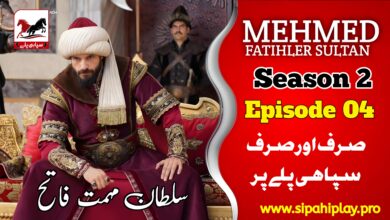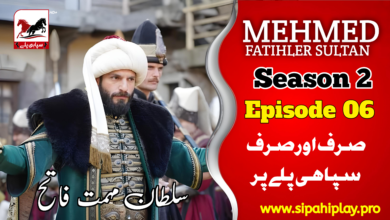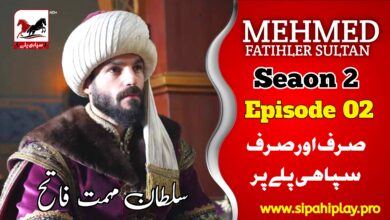
Sultan Muhammad Fateh Episode 16 takes viewers deeper into the historical and strategic brilliance of Sultan Muhammad II, also known as Muhammad al-Fatih, the conqueror of Constantinople. As the Ottoman Empire inches closer to its most significant conquest, Sultan Muhammad Fateh Episode 16 is a pivotal moment in the series, reflecting not only the Sultan’s tactical genius but also the emotional depth behind his leadership.
Sultan Mehmed Fateh Season 2 Episode 1 (16) with Urdu Subtitles
Overview of Sultan Muhammad Fateh Episode 16 One of the key highlights of Sultan Muhammad Fateh Episode 16 is the depiction of the Ottoman siege tactics. This episode intricately portrays the preparations for the final assault on Constantinople. Sultan Muhammad Fateh’s forces, already in position, begin implementing a series of strategic maneuvers that mark the turning point of the siege. The Ottoman army’s use of advanced artillery, including their famous cannons designed by the Hungarian engineer Orban, is shown as a crucial element in wearing down the Byzantine defenses.
Episode 16 emphasizes the balance between military might and diplomacy. While the Sultan’s army continues its relentless attack on the city’s walls, there are also attempts at negotiation, as emissaries from Constantinople seek terms of surrender. However, Sultan Muhammad Fateh remains steadfast in his vision of taking the city by force, determined to fulfill what he believes is his divine destiny.
Sultan Mehmed Fateh Season 2 Episode 1 (16) with Urdu Subtitles
Leadership and Strategy of Sultan Mehmed Fateh
Throughout this episode, viewers witness the Sultan’s exceptional leadership, his ability to inspire loyalty, and the deep trust he places in his commanders. Episode 16 highlights how Sultan Muhammad Fateh personally engages in discussions with his closest advisors, including the brilliant Grand Vizier Zaganos Pasha and the experienced General Halil Pasha. These moments offer insight into his tactical mind, as the Sultan listens to various viewpoints but ultimately makes decisions with firm resolve, embodying both wisdom and strength.
The emotional weight of his role as both a commander and a leader of his people becomes more apparent in this episode. Sultan Muhammad Fateh is not only conquering a city; he is also shaping the future of the Ottoman Empire. Episode 16 masterfully shows his moments of quiet contemplation, where the burden of history rests heavily on his shoulders. His connection to the Prophet Muhammad’s prophecy—that Constantinople would one day be conquered by a noble leader—adds a layer of spiritual significance to his mission.
Sultan Mehmed Fateh Season 2 Episode 1 (16) with Urdu Subtitles
The Role of Faith
Faith plays a crucial role in this episode, as it does throughout the series. Sultan Muhammad Fateh’s unwavering belief in his destiny as the one to fulfill the prophecy is a source of strength for him and his soldiers. The episode illustrates how Islamic values and teachings guided the Sultan’s decisions. His reliance on prayer and spiritual reflection before major battles serves as a reminder of the religious dimensions that underpinned his ambitions.
In Episode 16, the Sultan’s devotion to his faith contrasts sharply with the desperation of the Byzantine defenders, who are shown turning to different means to protect their city. The cultural and religious tension between the Ottoman Muslim forces and the predominantly Christian Byzantine defenders is subtly woven into the narrative, further deepening the historical context of this conflict.
Watch Now Sultan Mehmed Fateh Season 2 Episode 1 (16) with Urdu Subtitles
The Climactic Assault on Constantinople
The build-up to the final assault on Constantinople is a key moment in this episode. Viewers are given a front-row seat to the strategic brilliance of Sultan Muhammad Fateh as he orchestrates the movements of his troops, the placement of artillery, and the logistics of a large-scale siege. The use of tunnels, naval blockades, and the relentless bombardment of the city’s walls show just how comprehensive and well-planned this military campaign was.
The battle scenes in Episode 16 are visually stunning, capturing the chaos and brutality of siege warfare. At the same time, the emotional stakes are high for both the defenders of Constantinople and the attacking Ottoman forces. This episode skillfully balances the action with moments of reflection, focusing on the personal stories of soldiers, commanders, and civilians caught in the middle of this historic event.
Sultan Mehmed Fateh Season 2 Episode 1 (16) with Urdu Subtitles
Server 1
Server 2
Historical Accuracy and Drama
Sultan Muhammad Fateh has been praised for its attention to historical detail, and Episode 16 is no exception. While dramatic elements are naturally included to enhance the narrative, the series remains faithful to the historical events surrounding the Fall of Constantinople in 1453. The portrayal of key figures, such as Emperor Constantine XI of Byzantium and Sultan Muhammad Fateh himself, remains grounded in historical records, ensuring that the audience gains a deeper understanding of the personalities involved in this pivotal moment in history.
One of the strengths of this episode lies in its ability to humanize both the Ottoman and Byzantine characters. Emperor Constantine XI is shown as a ruler struggling to defend his city, aware of the inevitable but unwilling to surrender without a fight. Similarly, Sultan Muhammad Fateh, while portrayed as a confident and determined leader, is also depicted as a man fully aware of the gravity of his actions and their long-term implications.
Conclusion of Sultan Mehmed Fateh Episode 1 (16) Urdu
Sultan Muhammad Fateh Episode 16 sets the stage for the ultimate conclusion of the siege and the eventual fall of Constantinople. The episode ends with the promise of greater challenges ahead, as the final breach of the city’s defenses seems imminent. For viewers who are deeply invested in the historical significance of this moment, the episode offers a tantalizing glimpse into the triumph that is yet to come.




